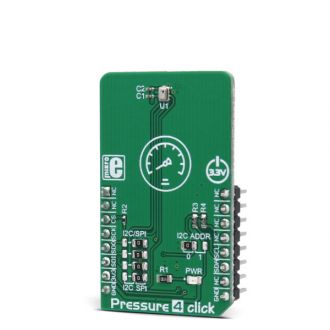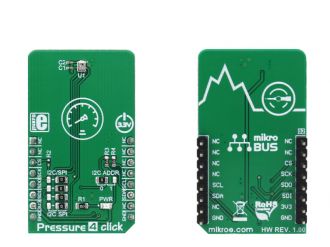
We strongly encourage users to use Package manager for sharing their code on Libstock website, because it boosts your efficiency and leaves the end user with no room for error. [more info]

Rating:
Author: MIKROE
Last Updated: 2018-06-08
Package Version: 1.0.0.0
mikroSDK Library: 1.0.0.0
Category: Pressure
Downloaded: 5427 times
Not followed.
License: MIT license
Pressure 4 click is an absolute barometric pressure measurement Click board, which features a low power consumption, high precision barometric pressure sensor.
Do you want to subscribe in order to receive notifications regarding "Pressure 4 click" changes.
Do you want to unsubscribe in order to stop receiving notifications regarding "Pressure 4 click" changes.
Do you want to report abuse regarding "Pressure 4 click".


Library Description
This library will allow a user to read the pressure and temperature values.
Key functions:
Examples Description
void applicationTask()
{
double tmp;
char text[10];
mikrobus_logWrite("Temperature : ",_LOG_TEXT);
tmp = pressure4_getTemperature();
FloatToStr(tmp,&text[0]);
mikrobus_logWrite(&text[0],_LOG_TEXT);
mikrobus_logWrite(" �C", _LOG_LINE);
mikrobus_logWrite("Pressure : ",_LOG_TEXT);
tmp = pressure4_getPressure();
FloatToStr(tmp,&text[0]);
mikrobus_logWrite(&text[0],_LOG_TEXT);
mikrobus_logWrite(" hPa", _LOG_LINE);
mikrobus_logWrite("========================",_LOG_LINE);
Delay_ms(500);
}
mikroE Libraries used in the example:
Additional notes and information
Depending on the development board you are using, you may need USB UART click, USB UART 2 click or RS232 click to connect to your PC, for development systems with no UART to USB interface available on the board. The terminal available in all MikroElektronika compilers, or any other terminal application of your choice, can be used to read the message.